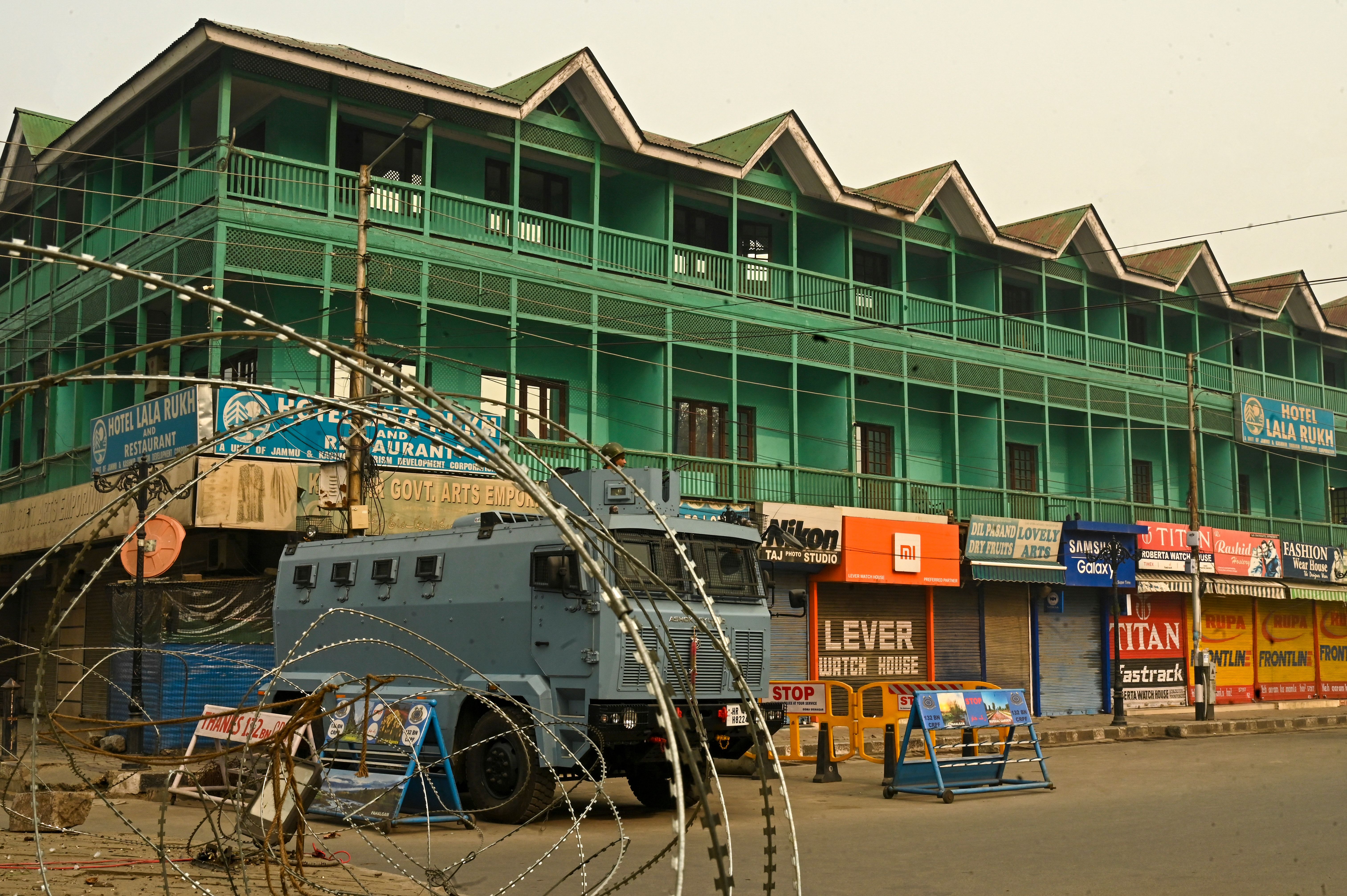The Kashmiri teachers who lost their jobs ‘in the interests of national security’
Rights activists say the blanket use of special laws to terminate government employees could create a chilling effect on freedom of speech, reports Namita Singh


A 55-year-old teacher, Nisar Ahmad Tantray, was giving online classes from his home in Jammu and Kashmir when someone knocked on his door. He stepped out to find two government employees waiting for him with an envelope in their hands.
It did not take long for him to realise they were carrying an order terminating his services as a senior employee at a public school.
The letter said the lieutenant governor was satisfied that “in the interest of the security of the state, it is not expedient to hold an enquiry in the case” and “accordingly, the Lieutenant Governor hereby dismisses Mr Nisar Ahmad Tantray … with immediate effect”.
Indian-administered Kashmir has for decades suffered from violent insurgency and instability along a fractious border with Pakistan, and is one of the most highly militarised zones in the world, with clashes between these security forces and the local population becoming common as a result.
But Tantray says he has never had any brushes with the authorities himself and does not understand which of his “activities” were deemed to be a threat to the “security of the state”.
“I was left shell-shocked,” Tantray tells The Independent.
“I have no idea why I lost my job,” he says, as he laments the government’s decision to do away with an inquiry against him or give him a fair opportunity to respond.
He is not the only one to have been dismissed without being informed about the grounds of termination. TheIndependent has seen nearly a dozen and a half such orders where the lieutenant governor of the erstwhile state has dismissed a government employee from their service without providing a specific reason why, although lawyers estimate there are at least two dozen such cases.
The Independent approached the lieutenant governor’s office by phone calls and email, but had not received a response by the time of publication.
Government jobs are highly sought-after in India, in part because of the security they bring. Article 311 of the Indian constitution gives protection to such employees from arbitrary termination of their services, explains advocate Habeel Iqbal. “This means a government employee cannot be terminated – unless he is given a notice, [his side] is heard and a disciplinary inquiry is initiated against him, and he will not be reduced in rank by an officer who is inferior to him.”
But under a sub-clause of Article 311, a person may be dismissed if the “president or the governor, as the case may be, is satisfied that in the interest of the security of the state, it is not expedient to hold such inquiry”.
The Jammu and Kashmir administration in April last year announced the creation of a special task force to investigate employees and terminate their services under this sub-clause. About a week later three government employees received a letter informing them about the immediate termination of their services.
“This provision was supposed to be used very rarely,” says Iqbal. “So, strictly speaking legally, have the government done it as per the law? Yes. But have they done it fairly? Well, no. When you are using it on a blanket basis, the objective seems to be to create a chilling effect on the employee and basically, is an assault on the freedom of speech and expression, and right to independent thinking.”
In another order dated 16 September 2021, the government tightened the employment rules in the union territory, making a government employee liable for the actions of their kin and holding them responsible for their relatives’ involvement in “act of espionage, treason, terrorism, subversion, sedition”.
Under the amended rules, failure to report such relations “known to be directly or indirectly hostile to India’s national and security interests” could be grounds for the termination of the services of a government employee.
Though Tantray received the termination order before the new employment rules came into effect, he wonders out loud if it was his relationship with his three brothers that led to his job loss.
His three elder brothers were members of the political group Jamaat-e-Islami for about four decades before it was banned by the federal home ministry in February 2019. The government of India banned the organisation for five years, saying that it is “involved in anti-national and subversive” activities “intending to cause disaffection”.
Prior to the ban, his brothers had several run-ins with the authorities, but Tantray claims they were never arrested. “The police has called them multiple times. They never had an FIR [preliminary charge sheet] registered against them,” he says.
He believes that he is being punished for the affiliations of his brothers because the government cannot go after them directly, as they are now retired. “Because they were retired and I was the only one in the family who was working and was employed. The government realised that their target was me and therefore, the action was taken against me.”
Criticising the series of government orders, activist-scholar Ather Zia says the new termination rules are “part of this renewed policy by the Narendra Modi-led Hindu-nationalist Bharatiya Janata Party where there is no place for freedom of expression in the region”.
“The administration is now trying to categorise the people of Kashmir as anti-national, terrorist sympathisers and through these new statutes, the government is trying to further ensure that there is no space for any kind of dialogue or discourse or dissent.
“I think it is like being in a cage in Kashmir. This is a kind of dehumanisation where all statutes of justice are bypassed and every act of dissent is being criminalised. You can merely lose your job by sheer association with someone,” she says.

Javid Ahmad Shah, 59, was only a few months from his retirement when he received a similar letter in November last year, informing him about the termination of his services. Like Tantray, he was not subject to any internal departmental inquiry and does not know the reason why he was removed from his post of principal of a government girls’ school in Anantnag, Kashmir.
A victim of violent militancy himself, Shah not only survived multiple bullet injuries but also lost his brother in-law to the insurgents. So when he received the government’s letter deeming his termination “in the interest of national security”, he found it hard to digest.
“On 22 October 1993, I received multiple bullet injuries. I was caught in an incident in the market in Bijbehara. Since then, my legs have stopped working and even now, I cannot walk without crutches and sticks. My life has been confined to one room,” he says as he tries to fight back the tears.
“My brother-in-law, the husband of my elder sister, was killed by Hizbul Mujahideen. He used to work in the police as head constable. On 14 October 2000, the militants hanged him to death. They called him a traitor. They said he was a government informer.
“I had to dig his grave alone. Nobody came to the house to lend a helping hand because everyone in the neighbourhood was boycotting us. Our neighbours think we are government informers and the government thinks of us militants. You tell me who I am because I certainly cannot…” says Shah. “This is sheer irony. I don’t have words to express the pain I am in.
“I would like to appeal to the government with folded hands and tell them that I have done nothing wrong… That I am not at fault.”
While Tantray and Shah did not have a direct clash with the authorities themselves, that’s not the same for all the employees terminated under Article 311.

Idrees Jan Mir, 39, a middle school teacher in Kupwara district of north Kashmir, was arrested twice – in 2010 and in 2016.
In 2010 he was booked under charges related to the damage of public property and attempted murder and held behind bars for about a month. The court acquitted him in 2019, as it slammed the prosecution for failing to “produce and examine a single witness” in the case.
In August 2016, Mir was detained under the Public Safety Act (PSA) over allegations of stone-pelting and was lodged in Kot Bhalwal jail in Jammu for four months. The Jammu and Kashmir High Court, in December that year, quashed the detention after rendering it “illegal”. It criticised the authorities for failing to provide Mir with the material on the basis for which he was detained under the preventive detention law.
Denying the earlier charges against him, Mir says they were brought because of his “difference in ideology, and for hoping that there [will be] no corruption and human rights violation in Kashmir”.
The normal course of action for a government employee facing criminal proceedings would be to put them under suspension, says Iqbal. “At the end of the day, [the government] will see whether [the criminal case] results in an acquittal or conviction. After that conviction, the government can take these harsh and draconian measures of dismissal or termination. Not before that,” he says.
Slamming the termination order, Mir asks: “Some of my students are police officers, others are in the Indian army. How would they have been on such positions, if I was not teaching them well?
“If because of my books, because of my writings, I am a threat to national security, then I understand that India is a weak country, that this is not a democracy,” he adds. “I don’t think I will beg the government to reinstate me. I was in the department because I was competent. I earned it.”






Join our commenting forum
Join thought-provoking conversations, follow other Independent readers and see their replies
Comments